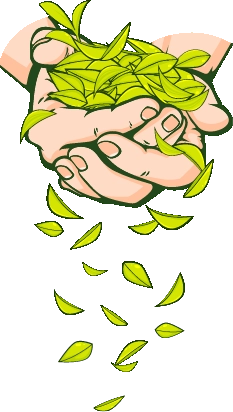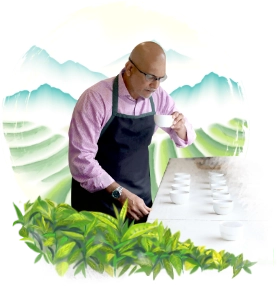Muscatel Teas : Mercurial, Magical, Mystical!
“Tastes like sweet-sour peaches grilled on charcoal, with an undertone of tobacco.”
“No, no – I get a distinct lychee, grapes and hint of spice…and cedar!”
“Come on, how can’t you taste honey and cantaloupe and plums?”
These are typical reactions of experienced tea tasters when they sip the elusive Muscatel teas from Darjeeling. And perhaps there is no other topic that is as much debated as Muscatel teas. And if you were to sneak in and take a sip, you would perhaps differ with all of them…and join the heated debate!
Welcome to the mercurial, magical and mystical world of Muscatel teas.
The Magic and the Mystery…and the Myth!
Much like Cinderella’s magical hour, Mother Nature’s magic at select Darjeeling tea estates also happens for a brief ten-day to two-week period in late summer – end May to mid-June. What makes Muscatel teas so elusive, almost ephemeral, is their uncertainty and the unpredictability. An estate can produce finest Muscatel teas this year, and next year, the magic can completely bypass it.
Here is now nature’s magic combines with human genius to produce this mercurial, magical and mythical tea :
The hot, humid and rainy climate in late summer in Darjeeling causes a rapid rise in infestation. Small insects and flies thrive on the rich flora and fauna during this period, which is also the peak Second Flush period in Darjeeling tea estates. Green insects called Jassids and Thrips appear abundantly around the tea plants. While they are definitely pests, they are vital catalysts for producing the Muscatel flavour.
Greenish in colour, they are like leaf-hoppers, just about a tenth of an inch in size. They feed upon the tender buds and leaves of the tea-bush, feasting on the rich sap. As they suck out this sap, the moisture content in leaves reduces, causing them to get stunted, shrivel and curl. Also, due to the many tiny needle-points created by these insects on the tea leaves, natural fermentation occurs even though the leaves are not yet plucked. With lesser moisture content, the flavours get concentrated, and the green leaf starts turning yellow. A chemical compound called Terpene is also produced within the tea leaves and buds. During the oxidations (fermentation) process, it is this compound Terpene that creates the unique Muscatel flavour.
And yet, there are some planters who will dismiss this explanation outright! They regard this explanation as a myth. While they concede teas made during the second flush period that are affected by Jassids, do make exceptional teas with distinct fruity notes, they still do not and should not qualify as true Muscatel teas. They believe that pure Muscatel teas are produced only from authentic Chinary bushes without intervention or infestation of insects. For them, it is the combination of nature’s quirk and human skill that creates this most enigmatic of teas.
Character
Pure Muscatel flavour ranges intense, sweet and fruity. From the whiff of woody cedar to perfumed peaches to spiced honey, a Muscatel tea can contain all these notes. When brewed properly, it has amber liquor (yellowish orange or orangish yellow) with a very positive and sweet ‘nose’ and a mellow to mild astringency. When stored properly, Muscatel teas are like wine, and get better as they mature, tasting more intense and adding layers of flavours.
The First Muscatel Tea
The first Muscatel tea was produced at the world-famous Castleton Tea Estate in 1985. The credit goes to the then factory manager of the estate, Mr. Gomden. He noticed in June of 1985 that the teas produced had a very peculiar and intense flavour, which was quite unlike and different from the normal flavoury teas produced during the time. Upon tasting these, he found that they had a distinct fruity flavour, rich and intense that lingered on the palate. It reminded him of the rich, intense flavour of the Muscat grapes, used for making fine wines. He named this batch of teas, Muscatel – like Muscat grapes. Since then, Castleton Muscatel teas have won top awards and honours internationally, not to mention world-record prices. In 1992, a lot of Castleton FTGFOP1 Muscatel tea was sold for Rs. 13,0001 per kg. at the Calcutta tea auction.
Today, select estates that make fine Muscatel teas include Jungpana, Giddapahar, Gopaldhara, Seeyok and Okayti. From the top tea boutiques in the world to the most exclusive and prestigious tea-rooms in the UK and Europe, Muscatel teas are amongst the most prized and sought after by connoisseurs. And the moments of sipping and savouring this exquisite Muscatel tea becomes life’s sweetest memories – like the shortest love.

Tea is a religion in the art of life.

